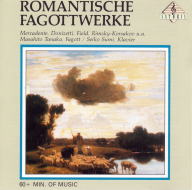
|
| 1. |
Julius Weissenborn |
Arioso, op.9 no.1 |
|
| 2. |
Gaetano Donizetti |
Romanza 'Una furtiva lagrima' |
 |
| 3. |
Saverio Mercadente |
Cavatina di Donna Caritea |
|
| 4. |
Jules Dermersseman |
Introduction and Polonaise |
|
| 5. |
Rimsky-Korsakov |
The flight of the Bumble-Bee |
|
| 6. |
John Field |
Nocturne no.5 |
|
| 7. |
Ludwig Milde |
Romanze |
|
| 8. |
Eugene Bourdeau |
Premier solo |
 |
| 9. |
Briccialdi |
Il Carnevale di Venezia, op.77 |
|
| 10. |
Carl Almenrader |
Introduction and Variation |
|
| 11. |
Carl Jacobi |
Pot-pourri, op.16 |
|
|
Masahito Tanaka bassoon
Seiko Sumi pianoforte |
|
Press Quotes
|
"... the artist, Masahito TANAKA, is one of the best
Bassoonists that I have heard. Nothing is missing: an astounding technical
mastery, a sound of exceptional homogeneity, an expressivity void of vain
sentimentality allow him to play brilliantly and with good taste pages that
otherwise could easily slip down to vulgarity."
Edouard Mousset (HARMONIE-OPERA 12/1982) France |
"... they are played so musically by this most virtuosic
Japanese Bassoonists... Tanaka is such a fine musician that he can imbue
the daunting pyrotechnics with a sensitivity of phrasing and balance that
transcends the printed score."
Barbara Jahn(Hi-Fi News 2/1983)England |
"... a highly coloured portrait of the modern Bassoon.
Admire the polychromy of its brilliant technique, the stunning velocity
of which it is capable... When listening to this record, one thinks that
the Symphony Orchestra of the Belgian National Opera is lucky to have Masahito
Tanaka as Solo Bassoon."
Michel Debrocq(Le Monde de la Musique 1984)France |
These Japanese players are well attuned to the German Romantic
language of all this music, ... Good tone and splendid agility from Tanaka.
J.D.W.(Fanfare 1983) U.S.A |
"... like R-Korsakov's Flight of the Bumble Bee, one minute
and three seconds of vertiginous velocity on the part of Masahito TANAKA.
It is simply incredible.. Tanaka is an artist who knows how to make his
bassoon sing, conferring it the flexibility of the human voice and reaching
even the highest-C ( which is one octave from SACRE's C )."
Alice Libert(Le Derniere Heure 1984) Belgium |
